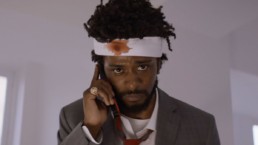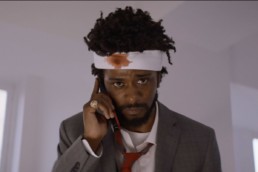Boots Riley’s ‘Sorry to Bother You’ is Brash, Ballsy, and Flat-out Bonkers
This is a custom heading element.
This review originally ran on February 6, 2018, during the Sundance Film Festival
Sorry to Bother You may sound apologetic, but it’s every bit as brash, ballsy, and bonkers a movie that I’ve seen in a directorial debut.
Sorry to Bother You may sound apologetic, but as a directorial debut, it’s every bit as brash, ballsy, and bonkers of any movie I’ve seen. First-time filmmaker Boots Riley’s satirical film captures the level of selling out that people will stoop to in the pursuit of success. This zany comedy, which is set in an alternate present-day Oakland, portrays a young man of color who takes a telemarketing job and, in an effort to increase his sales, literally adopts a “white dialect” to speak to his customers. This could have been the extent of where the movie settles, to explore this concept more thoroughly, but Riley’s unbridled creativity continues to seep in and we find that this storyline is just the beginning.
Lakeith Stanfield plays Cassius ‘Cash’ Green, a young man whose objective is to line his pockets with a little extra money. After starting the new job as an entry-level telemarketer, he takes the advice from senior co-worker, Langston (Danny Glover), to adopt a “white voice” (voiced by David Cross), in order to connect with his customers during cold calls. In hilarious fashion, when Stanfield opens his mouth, Cross’ voice is overdubbed, and the movie has fun inserting a “square dialect” into Stanfield’s soulfully visual performance. It’s this sort of playful comedy that makes Sorry to Bother You a fun time, and its comparison to the result of a Spike Jonze and Spike Lee lovechild are accurate.
Boots Riley is equally interested in fostering a message of activism in addition to the investment of strong comedic elements. Cash realizes that his newfound success comes at a price when his new status puts him at odds with the lesser established co-workers. It gets to a point where Cash must decide to cross a picket line made up of his bohemian girlfriend, Detroit (Tessa Thompson), and best friend, Squeeze (Steven Yeun). The decision of who chooses to assist him in getting to work each day, creates an emotional hardship that he weighs against his large paycheck.
The film ends with one of the most head-spinning twists that would be less fun to spoil here, even though it could use a little more editing in its final act before it makes you do a double take.
All of this is put on the highest stage when Cash rises in the ranks to become one of the agency’s best employees and into the inner circle of the company’s CEO Steve Lift (Armie Hammer). This is when a dark secret that the company is harboring comes to light. The film ends with one of the most head-spinning twists that would be less fun to spoil here, even though it could use a little more editing in its final act before it makes you do a double take.
Sorry to Bother You is commanding; it is either making you laugh or making you think. Riley does a very good job pulling in all elements, specifically the production design by Jason Kisvarday, in which everything is so detailed it creates a visually rich movie. The ensemble cast does well, with Stanfield carrying the movie on his back, Tessa Thompson delivers another fierce and unwavering performance, Armie Hammer has fun as the bat-shit CEO, and David Cross and Patton Oswalt’s “white voices” are a huge part of the laughs. Sorry to Bother You will find success with audiences willing to have a good time and entertain new visual thoughts. The film was picked up by Annapurna Pictures after making its world premiere at Sundance this year for a reported seven figures.
105 mins. ‘Sorry to Bother You’ is rated R for pervasive language, some strong sexual content, graphic nudity, and drug use. Opening this Friday at ArcLight Hollywood.
Ryan Rojas
Ryan is the editorial manager of Cinemacy, which he co-runs with his older sister, Morgan. Ryan is a member of the Hollywood Critics Association. Ryan's favorite films include 2001: A Space Odyssey, The Social Network, and The Master.


